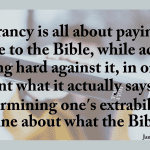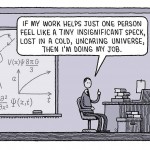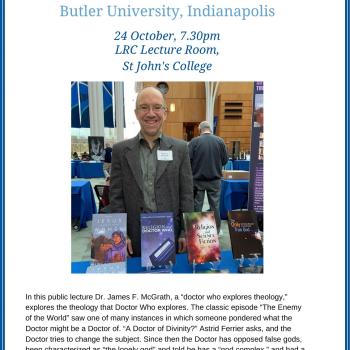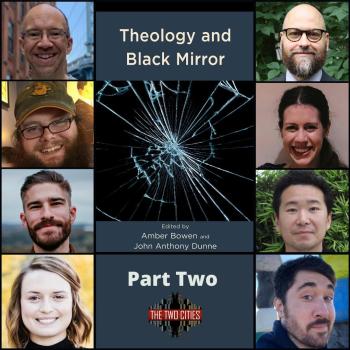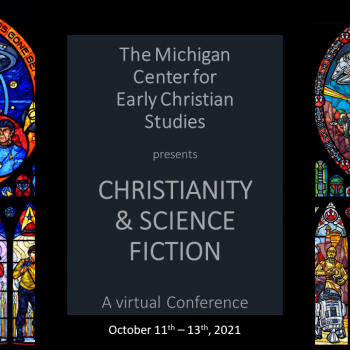This blog post was sparked by a question raised in a post on the blog Red Letter Christians:
Why don’t more of us study and think of theological giants like the Rev. Martin Luther King, Jr., and his chief of staff, the Rev. Wyatt Tee Walker, as theologians? Social justice luminaries such as King and Walker are somehow viewed only as activists or civil rights leaders — but not as theologians. This is problematic.
I agree. The stereotype of the “ivory tower” and of academics as engaging in research that is irrelevant to daily life, never mind issues of social justice, is one that need not and should not persist. It will always be true that some of what academics research will at least seem unrelated to practical matters, whether or not that happens to be the reality. Even then, those small pieces may be part of a larger puzzle. It is debatable, for instance, whether Martin Luther King Jr.’s theology and activism would have taken the shape that they did without his having had a foundation of mainstream biblical studies scholarship and the theology of the social gospel to build his own approach upon.
Tommie Shelby wrote recently about MLK:
King had some aspirations toward an academic career before he pursued the ministry. Had the times been different, he might have been among us in that way. But academic philosophers are slow to accept outsiders as thinking with the depth and rigor that they expect from their peers. There are exceptions—even exceptions who are black, like Frantz Fanon—but it’s a hard bias to get over. Someone like King is up against a lot.
King is also not just an activist but a Christian activist, and not only a Christian but a minister. Contemporary philosophers don’t often speak about their religious background, and it can be difficult for people in such a secular discipline to see someone who takes to the pulpit as engaged in a similar intellectual pursuit.
The entirety of her interview about MLK as activist philosopher is worth reading. See also Lilian Calles Barger’s interview about liberation theology and a number of divides that it challenges.
People are more likely to look back at activists of the past – whether Amos of Tekoa or MLK – with fondness, than to appreciate their contemporaries who offer comparable challenges in their own time. As a cartoon that you may have seen nicely encapsulates, we all want change for the better, but we don’t like to change.
Supporters of the status quo – or of moving backwards – often get a pass in certain theological, ecclesiastical, and societal circles. As long as that remains true, at the very least, those who advocate for change and forward movement should get the same courtesy.
There have also been a couple of reflections by Jim Burklo on the intersection of mysticism and social activism. See his posts on Watching the Watchers: Mindful Mysticism and Social Change and Revolutionary Mysticism. Of related interest is Marika Rose’s syllabus about religious mysticism and philosophy.
It is interesting that the sense of a separation between “expert” and “activist” is particularly felt in the realm of theology. Perhaps that is because activist theologians tend to be thought of as “preachers” (wrongly contrasted with “thinkers” or “academics”). But the same or at least a similar issue has been raised about activism by professors and intellectuals in other fields. Here’s an excerpt from a good “sermon” on this topic by a former college president, that was published recently in Inside Higher Ed:
Higher education cannot ignore the creeping normalization of deceit or the maligning of its purposes of advancing learning, individual and community agency, identity and well-being, and civic engagement in seeking a common good. Higher education cannot risk turning its attention away, as though what we currently see is a melodrama which will run its course. To assume that we will return to “normalcy” eventually, or just after the next election, would be to run the risk, by silence, that the drama has indeed already become a replacement for reality.
Our responsibility as educators committed to the promise of learning for all — to the valuing of whole persons as they exercise their agency to pursue inquiry, to their inalienable right to happiness, to their well-being — is that we must not harbor silence. Ignorance, hatred, racism, misogyny and deceit are not part of a public dialogue that will create the kind of education our institutional missions champion or the democracy our country should promise — and should be striving to, even haltingly, realize. The comments that deceive and offend (and the supportive, pernicious silence that echoes them) are repugnant. In a democracy, they must be called out.
Higher education cannot abide by the promulgation of ignorance and ill will. The academy must claim its long-earned voice, must represent the values of critical thought built long ago into our institutional mission statements. In response to uncritical belief and the demands of authority, the enlightenment and the emergence centuries ago in this nation of democratic polity ensured that the voice of higher education would assert itself as a distinct dimension of our society and culture. While not above or better than others, we must recognize the duty and responsibility that accompany privilege — and not fail to speak to what we know is false, immoral, callous and hateful.
Presidents, campus leaders, each faculty and staff member, and every student in a learning community can use their professional, public and familial venues, friendship circles and Facebook pages in which they are given voice to speak out to write and protest — to have the courage to confront falsehoods by having explored themselves the claim and the evidence. They must decry the inclination to remain silent so as not to offend. Falsehoods, deceit and bigotry are not the presentation of balanced or alternative rational opinions or perspectives. And courtesy doesn’t extend to hate.
See too Vance Morgan’s post about morality in which he mentions Simone Weil and Desmond Tutu.
Also of related interest:


